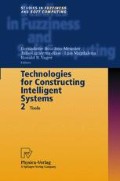Abstract
Partial abductive inference in Bayesian belief networks has been usually expressed as an extension of total abductive inference (abduction over all the variables in the network). In this paper we study the transformation of the partial problem in a total one, analyzing and trying to improve the method previously appeared in the literature. We also outline an alternative approach, and compare both methods by means of experimentation. The experimental results reveal that the problem of partial abductive inference is difficult to solve by exact computation.
Access this chapter
Tax calculation will be finalised at checkout
Purchases are for personal use only
Preview
Unable to display preview. Download preview PDF.
References
S.K. Andersen, K.G. Olesen, F.V. Jensen, and F. Jensen. Hugin: a shell for buiding belief universes for expert systems. In Proceedings of the 11th International Joint Conference on Artificial Intelligence, Detroit, 1989.
A.P. Dawid. Applications of a general propagation algorithm for probabilistic expert systems. Statistics and Computing, 2: 25–36, 1992.
L.M. de Campos, J.A. Gâmez, and S. Moral. Partial Abductive Inference in Bayesian Belief Networks using a Genetic Algorithm. Pattern Recognition Letters, 20 (11–13): 1211–1217, 1999.
J.A. Gâmez. Inferencia abductiva en redes causales. PhD thesis, Departamento de Ciencias de la Computación e I.A. Escuela Técnica Superior de Ingeniería Informatica. Universidad de Granada, 1998.
F.V. Jensen. An introduction to Bayesian Networks. UCL Press, 1996.
U. Kjærulff. Triangulation of graphs - algorithms giving small total space. Technical Report R 90–09, Department of Mathematics and Computer Science. Institute of Electronic Systems. Aalborg University, March 1990.
S.L. Lauritzen and D.J. Spiegelhalter. Local computations with probabilities on graphical structures and their application to expert systems. J.R. Statistics Society. Serie B, 50 (2): 157–224, 1988.
R. E. Neapolitan. Probabilistic Reasoning in Expert Systems. Theory and Algorithms. Wiley Interscience, New York, 1990.
D. Nilsson. An algorithm for finding the M most probable configurations of discrete variables that are specified in probabilistic expert systems. MSc. Thesis, University of Copenhagen, 1994.
D. Nilsson. An efficient algorithm for finding the M most probable configurations in Bayesian networks. Statistics and Computing, 2: 159–173, 1998.
J. Pearl. Distributed revision of composite beliefs. Artificial Intelligence, 33: 173–215, 1987.
J. Pearl. Probabilistic Reasoning in Intelligent Systems. Morgan Kaufmann, San Mateo, 1988.
B. Seroussi and J.L. Goldmard. An algorithm directly finding the K most probable configurations in Bayesian networks. International Journal of Approximate Reasoning, 11: 205–233, 1994.
B.K. Sy. Reasoning MPE to multiply connected belief networks using message passing. In Proceedings of the 11th National Conference on AI, pages 570–576. AAAI, 1993.
H. Xu. Computing marginals for arbitrary subsets from marginal representation in markov trees. Artificial Intelligence, 74: 177–189, 1995.
Author information
Authors and Affiliations
Editor information
Editors and Affiliations
Rights and permissions
Copyright information
© 2002 Springer-Verlag Berlin Heidelberg
About this chapter
Cite this chapter
de Campos, L.M., Gámez, J.A., Moral, S. (2002). On the Problem of Performing Exact Partial Abductive Inference in Bayesian Belief Networks using Junction Trees. In: Bouchon-Meunier, B., Gutiérrez-Ríos, J., Magdalena, L., Yager, R.R. (eds) Technologies for Constructing Intelligent Systems 2. Studies in Fuzziness and Soft Computing, vol 90. Physica, Heidelberg. https://doi.org/10.1007/978-3-7908-1796-6_23
Download citation
DOI: https://doi.org/10.1007/978-3-7908-1796-6_23
Publisher Name: Physica, Heidelberg
Print ISBN: 978-3-7908-2504-6
Online ISBN: 978-3-7908-1796-6
eBook Packages: Springer Book Archive

